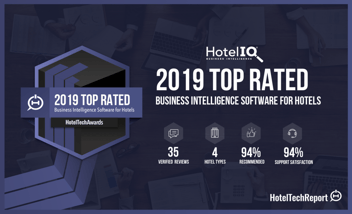BOOKING PACE: A LOVE AFFAIR THAT CAN BE MISLEADING
Read MoreIn the fast-paced and ever-evolving world of hospitality, effective hotel commercial management is essential for success. From revenue optimization to strategic marketing efforts, a comprehensive approach is needed to ensure a hotel's profitability and competitiveness in the market. In this blog post, we will delve into the intricacies of hotel commercial management, exploring key functions, effective strategies, emerging trends, as well as challenges and solutions faced by hoteliers in today's dynamic landscape. Whether you are a seasoned hotelier looking to enhance your commercial operations or a newcomer to the industry seeking valuable insights, this guide aims to provide you with a comprehensive understanding of hotel commercial management.
Table of Contents
Understanding Hotel Commercial Management
Hotel commercial management encompasses a wide range of activities and responsibilities that are crucial for the success and profitability of a hotel. It involves the coordination and integration of various departments and functions within a hotel to maximize revenue, drive sales, and enhance the overall guest experience. In this section, we will explore the fundamentals of hotel commercial management and its importance in the hospitality industry.
What is Hotel Commercial Management?
Hotel commercial management refers to the strategic planning, execution, and control of all commercial activities within a hotel. It involves managing revenue streams, sales and marketing efforts, distribution channels, and event and conference management. The primary goal of hotel commercial management is to optimize revenue and profits while ensuring guest satisfaction and loyalty.
The Role of Hotel Commercial Managers
Hotel commercial managers play a critical role in overseeing and implementing commercial strategies to achieve the hotel's financial objectives. They are responsible for analyzing market trends, developing pricing strategies, establishing partnerships, devising marketing campaigns, and monitoring sales and distribution channels. By effectively managing these aspects, they contribute to the hotel's overall success and competitiveness in the market.
Importance of Hotel Commercial Management
Hotel commercial management is vital for several reasons:
-
Maximizing Revenue: Effective commercial management ensures that all revenue streams, such as room bookings, food and beverage sales, and ancillary services, are optimized to generate maximum revenue for the hotel.
-
Competitive Advantage: By implementing innovative strategies, hotel commercial managers can differentiate their property from competitors, attract more guests, and gain a competitive edge in the market.
-
Guest Satisfaction: Commercial management involves understanding guest preferences, market demands, and trends. By aligning services and offerings accordingly, hotels can enhance guest satisfaction and encourage repeat business.
-
Financial Stability: A well-managed commercial operation ensures steady cash flow, cost control, and efficient resource allocation, leading to financial stability for the hotel.
-
Market Positioning: Through effective commercial management, hotels can position themselves strategically within the market, targeting specific customer segments and adapting to changing market dynamics.
-
Adaptability: Hotel commercial managers must stay updated with industry trends, technological advancements, and changing consumer behavior. This adaptability allows hotels to respond proactively to market shifts and maintain a competitive advantage.
Understanding the fundamentals and significance of hotel commercial management sets the stage for exploring the key functions that contribute to its success. In the following sections, we will dive deeper into revenue management, sales and marketing, distribution and channel management, as well as event and conference management, to gain a comprehensive understanding of hotel commercial operations.
Key Functions of Hotel Commercial Management
Hotel commercial management involves several key functions that work together to drive revenue, increase occupancy, and enhance guest satisfaction. In this section, we will explore four essential functions of hotel commercial management: revenue management, sales and marketing, distribution and channel management, and event and conference management.
Revenue Management
Revenue management is a crucial function within hotel commercial management that focuses on optimizing pricing and availability to maximize revenue. It involves analyzing market demand, setting room rates, managing inventory, and implementing strategies such as dynamic pricing and yield management. The primary goal of revenue management is to sell the right room, to the right guest, at the right price, and at the right time, ultimately maximizing revenue and profitability.
Sales and Marketing
Sales and marketing play a pivotal role in hotel commercial management by attracting guests, driving bookings, and increasing brand visibility. This function involves developing and implementing marketing strategies, managing advertising campaigns, conducting market research, and fostering relationships with travel agents, corporate clients, and online travel agencies (OTAs). Sales teams work closely with the marketing department to generate leads, negotiate contracts, and secure group bookings, ultimately driving revenue for the hotel.
Distribution and Channel Management
Distribution and channel management are critical functions that focus on effectively distributing hotel inventory across various booking channels. This includes managing direct bookings through the hotel's website, third-party online travel agencies, global distribution systems (GDS), and other distribution partners. Hotel commercial managers must monitor channel performance, optimize channel mix, and ensure rate parity to maximize exposure and revenue while maintaining a strong brand presence.
Event and Conference Management
Event and conference management is a specialized function within hotel commercial management that involves planning, organizing, and executing events, conferences, and meetings. Hotel commercial managers work closely with event planners, corporate clients, and internal teams to coordinate logistics, offer customized packages, and ensure seamless event experiences. By successfully managing events and conferences, hotels can generate additional revenue, increase occupancy during low-demand periods, and strengthen their reputation as event venues.
Understanding these key functions of hotel commercial management provides a foundation for implementing effective strategies. In the following section, we will explore various strategies and best practices that can be employed to optimize hotel commercial operations and drive success.
Effective Strategies in Hotel Commercial Management
Implementing effective strategies is crucial for hotel commercial management to maximize revenue, attract guests, and stay competitive in the market. In this section, we will explore key strategies and best practices that can be employed to optimize hotel commercial operations.
Dynamic Pricing
Dynamic pricing is a strategy that involves adjusting room rates based on real-time market demand, occupancy levels, and other factors. By leveraging technology and data analytics, hotels can set flexible pricing that fluctuates based on supply and demand dynamics. This strategy allows hotels to maximize revenue during peak periods and optimize occupancy during low-demand periods.
Market Segmentation
Market segmentation involves dividing the target market into distinct groups based on demographic, psychographic, and behavioral characteristics. By understanding the needs and preferences of different segments, hotels can tailor their marketing messages, pricing strategies, and offerings to effectively attract and retain specific customer groups. This strategy allows hotels to optimize revenue by catering to the unique requirements of different market segments.
Online Presence and Digital Marketing
In today's digital age, having a strong online presence is essential for hotel commercial management. Hotels must invest in a user-friendly and visually appealing website that showcases their property, amenities, and services. They should also leverage digital marketing channels such as search engine optimization (SEO), social media marketing, email marketing, and online advertising to reach and engage with potential guests. Online reputation management is also crucial to monitor and respond to guest reviews and feedback, maintaining a positive image and driving bookings.
Partnerships and Collaborations
Collaborating with strategic partners can significantly enhance a hotel's commercial performance. Partnerships can include affiliations with airlines, travel agencies, event organizers, and local businesses. By leveraging these partnerships, hotels can access new customer bases, offer exclusive packages and promotions, and tap into additional distribution channels. Collaborations with local attractions, restaurants, and tour operators can also enhance the guest experience and increase revenue through cross-promotion and guest referrals.
Upselling and Cross-Selling
Upselling and cross-selling strategies aim to increase the average spend per guest by offering additional services or upgrades. This can include upselling room categories, promoting add-on services such as spa treatments or room service, or cross-selling dining options or special packages. By effectively implementing upselling and cross-selling techniques, hotels can boost revenue and enhance the overall guest experience.
By incorporating these effective strategies into hotel commercial management practices, hoteliers can optimize revenue streams, increase market share, and achieve long-term success. In the next section, we will explore emerging trends in hotel commercial management that are shaping the industry's future.
Emerging Trends in Hotel Commercial Management
Hotel commercial management is continuously evolving to adapt to changing market dynamics and consumer preferences. In this section, we will explore emerging trends that are shaping the future of hotel commercial management.
Technology and Automation
The integration of technology and automation is revolutionizing hotel commercial management. From revenue management systems to customer relationship management (CRM) software, hotels are leveraging technology to streamline operations, enhance data analytics, and automate processes. Artificial intelligence (AI) and machine learning algorithms are being utilized to optimize pricing, personalize guest experiences, and automate routine tasks. Additionally, mobile apps and self-service kiosks are becoming popular tools for guests to book, check-in, and access hotel services, providing convenience and efficiency.
Personalization in Services
Personalization has become a key driver in hotel commercial management. Guests expect tailored experiences that cater to their specific preferences and needs. Hotels are leveraging guest data and CRM systems to create personalized marketing campaigns, offer personalized recommendations, and provide customized services. This includes personalized room amenities, customized dining experiences, and tailored promotions based on guest preferences, loyalty status, and past behaviors. By delivering personalized experiences, hotels can enhance guest satisfaction and foster loyalty.
Sustainability Practices
Sustainability is a growing concern for both hoteliers and guests. Hotels are adopting eco-friendly practices and implementing sustainable initiatives to reduce their environmental impact. This includes energy-efficient technologies, waste reduction and recycling programs, water conservation measures, and green certifications. Incorporating sustainability practices not only aligns with guest values but also provides cost savings and enhances the hotel's brand reputation.
Social Media and Influencer Marketing
Social media platforms have become powerful marketing tools for hotel commercial management. Hotels are leveraging social media channels to showcase their property, engage with guests, and promote special offers. Influencer marketing has also gained traction, with hotels partnering with social media influencers to reach a wider audience and generate brand awareness. It is crucial for hotels to have a strong social media presence, engage with followers, and monitor online conversations to maintain a positive brand image.
These emerging trends in hotel commercial management are shaping the industry's future and providing opportunities for hotels to stay competitive and meet the evolving demands of guests. However, along with these trends come challenges that hoteliers must navigate. In the next section, we will explore the challenges faced by hotel commercial management and potential solutions to overcome them.
Challenges and Solutions in Hotel Commercial Management
Hotel commercial management is not without its challenges. In this final section, we will explore some of the common challenges faced by hoteliers in their commercial operations and discuss potential solutions to overcome them.
Economic Fluctuations
One of the biggest challenges in hotel commercial management is dealing with economic fluctuations. Economic downturns, such as recessions or financial crises, can significantly impact travel demand and consumer spending. During these periods, hotels may experience lower occupancy rates and reduced average daily rates (ADR). To overcome this challenge, hotels can implement strategies such as dynamic pricing, targeted marketing campaigns, and cost control measures. By closely monitoring market trends and adjusting pricing and marketing strategies accordingly, hotels can mitigate the impact of economic fluctuations and maintain profitability.
Intense Competition
The hospitality industry is highly competitive, with numerous hotels vying for the attention of potential guests. This competition can lead to price wars and pressure on profit margins. To stand out from the competition, hotels must differentiate themselves through unique offerings, exceptional customer service, and effective marketing strategies. Building a strong brand reputation, cultivating loyal customer relationships, and leveraging partnerships can help hotels establish a competitive edge in the market.
Changing Customer Expectations
As consumer preferences and expectations evolve, hotels must continuously adapt to meet their needs. Guests now expect personalized experiences, seamless technology integration, and sustainable practices. To address changing customer expectations, hotels can invest in technology solutions, implement guest loyalty programs, and actively seek guest feedback to make necessary improvements. By staying attuned to guest preferences and delivering exceptional experiences, hotels can build customer loyalty and maintain a competitive advantage.
Mitigating Risks and Crisis Management
Hotels face various risks, including natural disasters, security breaches, and health crises. Effective risk management and crisis response are crucial for hotel commercial management. Hotels should develop comprehensive risk management plans, implement robust security measures, and have contingency plans in place. Regular training of staff on emergency procedures and maintaining open communication channels with guests can help mitigate risks and ensure a swift response during crisis situations.
By recognizing these challenges and implementing proactive solutions, hoteliers can navigate the complexities of hotel commercial management and position themselves for long-term success in the industry.
In conclusion, hotel commercial management encompasses a broad spectrum of functions, strategies, and challenges. From revenue management to sales and marketing, distribution and channel management, event and conference management, hoteliers must employ effective strategies to optimize revenue, attract guests, and stay ahead of the competition. By embracing emerging trends, overcoming challenges, and continuously adapting to meet guest expectations, hotels can thrive in the dynamic and ever-evolving hospitality landscape.
%20(1).png?width=400&height=124&name=21051_HotelIQ_logo_BJ_PB_DM_GR-05%20(1)%20(1).png)




Comments